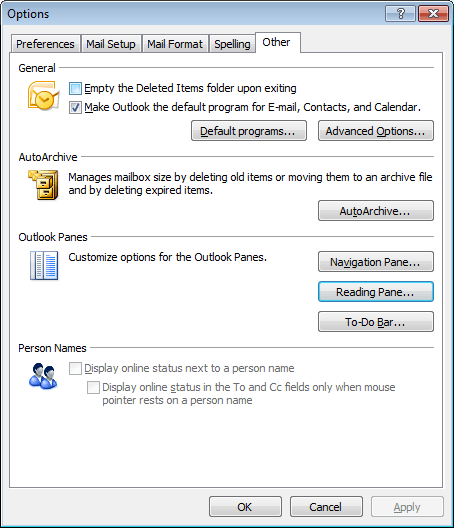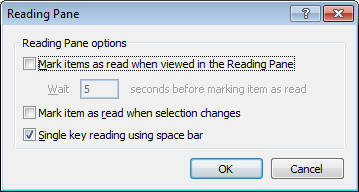TOPIC: PERSONAL INFORMATION MANAGERS
Turning off push notifications in Firefox 46
7th May 2016Firefox 44 introduced a feature I only recently noticed when Yahoo Mail offered browser notifications for new emails; I did not need this and could not switch it off permanently for that site. This meant I was bothered each time I checked that email address, an unnecessary irritation. Other websites offered similar push notifications but allowed permanent deactivation, making this a site-specific function unless you take an alternative approach.
Open a new browser tab and enter about:config in the address bar, then press return. If this is your first time, a warning message will appear, which you can dismiss permanently. This reveals a searchable list of options. Find dom.webnotifications.enabled and dom.webnotifications.serviceworker.enabled. By default, these values are set to 'true'. Double-click each one to change them to 'false'. This will prevent push notification offers from web services like Yahoo Mail, reducing intrusions during your browsing.
Changing Outlook usage habits
2nd August 2010Given that I have been using it for so long, I shouldn't be discovering new things with Outlook. However, there is one thing that I have been doing for years: leaving messages set as unread until I have dealt with them. Now that I look at it, it seems a terrible habit compared with an alternative that I recently found.
Quite why I haven't been flagging messages for follow-up instead is beyond me. Is it because I worked with Outlook 2000 at my place of work for so long, and the arrival of Outlook 2007 into my life wasn't sufficient to force a change of habits? In fact, it has taken a downgrade to Outlook 2003 to make it dawn on me; it was the sight of search folder for messages marked for follow-up that triggered the realisation.
Speaking of old habits, there is one that I'll be dropping: setting up loads of rules, allegedly for organising messages. Given that they were the cause of my missing emails quite a few times, it's one more nuisance that needed to be left behind me.
A little thing with Outlook
24th July 2010When you start working somewhere new like I have done, various software settings that you have had at your old place of work don't automatically come with you, leaving you to scratch your head as to how you had things working like that in the first place. That's how it was with the Outlook set up on my new work PC. It was setting messages as read the first time that I selected them, and I was left wondering to set things up as I wanted them.
From the menus, it was a matter of going to Tools > Options and poking around the dialogue box that was summoned. What was then needed was to go to the Other Tab and Click on the Reading Pane Button. That action produced another dialogue box with a few check-boxes on there. My next step was to clear the one with this label: Mark item as read when selection changes. While there's another tick box that I left unchanged: Mark items as read when viewed in Reading Pane; that's inactive by default anyway.


From my limited poking around, these points are as relevant to Outlook 2007 as they are to the version that I have at work, Outlook 2003. Going further back, it might have been the same with Outlook 2000 and Outlook XP too. While I have yet to what Outlook 2010, the settings should be in there too, though the Ribbon interface might have placed them somewhere different. It might be interesting to see if a big wide screen like what I now use at home would be as useful to the latest version as it is to its immediate predecessor.
Understanding Outlook's 32 KB rule limit: What happens when you upgrade from Outlook 2000 to Outlook 2007
12th January 2010A move from Outlook 2000 to Outlook 2007 at work before Christmas resulted in deactivated Outlook rules and messages like the following when I tried reactivating them:
One or more rules could not be uploaded to Exchange server and have been deactivated. This could be because some of the parameters are not supported or there is insufficient space to store all your rules.
The cause is a 32 KB size limitation for all rules associated with your Exchange server account before Exchange 2007. With the latter, the default size increases to 64 KB and can be increased further to 256 KB by manual intervention. Though this wouldn't be a big issue if you had the option to store rules locally on your own PC, but that was removed after Outlook 2000, therefore explaining why I first encountered it when I did.
Microsoft has a useful article on their support website containing suggested remedies which aren't all as extreme as deleting some rules either. Consolidation and shortening of rule names are other suggestions, and you should never discount how much space the "run on this machine only" parameter takes up either. Still, Microsoft made an odd design decision that caused this issue, not that it is their first or even last such choice.
Moving Emails from Outlook to Evolution
3rd November 2007It seems a little strange to my eyes, but Evolution cannot import Outlook PST files. On one level, I see a certain amount of sense: after all, Outlook is a Windows application and Evolution remains resolutely on the Linux side of the divide. Nevertheless, it is still a pesky nuisance.
The cure is, very oddly, to import data from Outlook into Mozilla Thunderbird and pop the Thunderbird files into the Evolution mail folder. Both Evolution and Thunderbird share the same file formats, so all is hunky-dory, since Evolution should just realise that they are there and bring them in.
That's what happened for me, and I have now migrated all of my old emails. Evolution's single file import wizard is there for those times when a spot of extra persuasion is needed; the data files are those without the file extensions. As it happened, I didn't need it.